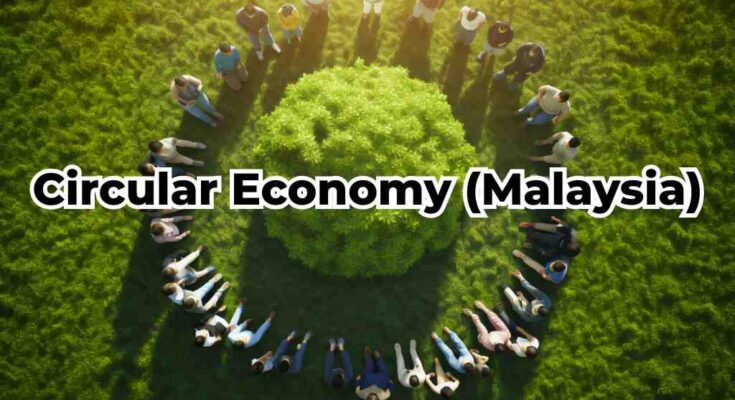Circular Economy (Malaysia): Driving Sustainable Growth
Introduction to Circular Economy (Malaysia)
In recent years, Malaysia has been making significant strides towards achieving sustainable development goals with Circular Economy (Malaysia). One of the key strategies being increasingly adopted is the concept of a circular economy (Malaysia). This innovative approach aims to minimize waste, maximize resource efficiency, and foster economic growth in a sustainable manner. In this article, we delve into the dynamics of circular economy (Malaysia) implementation in Malaysia and its potential to drive the country’s growth.
What is a Circular Economy (Malaysia)?
A circular economy is an economic model designed to regenerate resources, minimize waste, and prolong the lifespan of products and materials. Unlike the traditional linear economy, which follows a “take-make-dispose” pattern, a circular economy aims to close the loop by reusing, recycling, and repurposing resources at every stage of the production and consumption cycle.
Importance of Circular Economy (Malaysia) in Sustainable Development
The transition to a circular economy is crucial for achieving sustainable development goals, including environmental conservation, economic prosperity, and social equity. By promoting resource efficiency and reducing dependency on finite resources, a circular economy offers a pathway towards long-term resilience and prosperity.
Current Economic Scenario in Malaysia
Malaysia, with its vibrant economy and diverse industrial base, stands poised for sustainable growth. However, like many developing countries, Malaysia faces challenges related to environmental degradation, resource depletion, and waste management. Addressing these challenges is imperative for ensuring the country’s long-term economic viability and environmental sustainability.
Benefits of Implementing Circular Economy (Malaysia)
The adoption of circular economy principles offers a myriad of benefits for Malaysia:
Economic Growth Opportunities
Implementing circular economy practices can unlock new economic opportunities, such as the development of green industries, creation of jobs in the recycling and remanufacturing sectors, and stimulation of innovation and entrepreneurship.
Environmental Benefits
By reducing waste generation, promoting recycling, and minimizing resource extraction, circular economy initiatives contribute to environmental conservation, mitigating pollution, and preserving natural ecosystems.
Social Impacts
Circular economy practices have the potential to foster social inclusivity and improve the quality of life for communities by promoting sustainable consumption patterns, enhancing access to affordable goods and services, and empowering marginalized groups.
Circular Economy (Malaysia) Initiatives in Malaysia
In recent years, Malaysia has taken proactive steps to promote circular economy principles:
Government Policies and Regulations
The Malaysian government has introduced various policies and regulations to support the transition to a circular economy (Malaysia), including incentives for eco-friendly businesses, waste management regulations, and sustainable procurement practices.
Private Sector Involvement
Numerous businesses in Malaysia have embraced circular economy principles, implementing initiatives such as product redesign, waste reduction, and resource recovery. Companies across industries are investing in sustainable practices to enhance their competitiveness and meet consumer demand for environmentally responsible products and services.
Community Engagement
Community-based initiatives play a vital role in promoting awareness and participation in circular economy activities. NGOs, grassroots organizations, and educational institutions collaborate to organize recycling drives, awareness campaigns, and skill-building workshops to engage citizens in sustainable practices.
Success Stories of Circular Economy (Malaysia)
Several success stories exemplify the effectiveness of circular economy practices in Malaysia:
Case Studies of Businesses Implementing Circular Practices
– GreenTech Malaysia: This company specializes in converting agricultural waste into bio-based products, such as compost and organic fertilizers, reducing agricultural waste while generating income for farmers.
– Renewable Energy Corporation: By investing in solar energy and energy-efficient technologies, this corporation has reduced its carbon footprint and operational costs, demonstrating the financial viability of renewable energy solutions.
Challenges and Roadblocks
Despite the progress made, Malaysia faces several challenges in transitioning to a circular economy:
Obstacles to Implementing Circular Economy Practices
– Limited awareness and understanding of circular economy concepts among businesses and consumers.
– Lack of infrastructure and technology for waste collection, segregation, and recycling.
– Economic barriers, including high initial investment costs and limited access to financing for sustainable projects.
Solutions and Strategies to Overcome Challenges
– Increasing public awareness through education and outreach campaigns.
– Investing in infrastructure development and technological innovation for waste management and resource recovery.
– Providing financial incentives and support mechanisms for businesses to adopt circular economy practices.
Future Outlook
The future of circular economy in Malaysia looks promising, with growing momentum and support from various stakeholders:
Potential Growth and Development
As Malaysia continues to prioritize sustainable development, the adoption of circular economy principles is expected to accelerate, creating new opportunities for innovation, job creation, and economic diversification.
Role of Innovation and Technology
Advancements in technology, such as blockchain, artificial intelligence, and 3D printing, are poised to revolutionize the circular economy landscape, enabling more efficient resource utilization, supply chain transparency, and product lifecycle management.
Conclusion
In conclusion, the adoption of circular economy principles presents a compelling opportunity for Malaysia to achieve sustainable growth while addressing pressing environmental challenges. By fostering collaboration between government, industry, and civil society, Malaysia can harness the full potential of the circular economy to build a resilient and prosperous future for all.
FAQs
- What is the circular economy (Malaysia), and why is it important for Malaysia’s growth?
– The circular economy is an economic model focused on resource efficiency and waste reduction, offering opportunities for sustainable growth by minimizing environmental impacts and unlocking economic value from waste streams.
- How can businesses in Malaysia benefit from embracing circular economy principles?
– Embracing circular economy practices can enhance business resilience, reduce operational costs, and improve brand reputation by demonstrating commitment to sustainability and environmental stewardship.
- What role do consumers play in promoting the circular economy in Malaysia?
– Consumers play a crucial role in driving demand for sustainable products and services, influencing market trends, and holding businesses accountable for their environmental footprint through informed purchasing decisions.
- What are some examples of circular economy initiatives implemented by the Malaysian government?
– The Malaysian government has implemented various initiatives, including waste management programs, incentives for renewable energy adoption, and sustainable procurement policies to promote circular economy practices across sectors.
- How can Malaysia overcome challenges related
to infrastructure and technology gaps in transitioning to a circular economy?
– Malaysia can overcome infrastructure and technology gaps by investing in research and development, fostering public-private partnerships, and leveraging international collaborations to access expertise and resources for sustainable development.
#Circular Economy (Malaysia)
#Ajinomoto (Malaysia) Berhad
Want to know about sustainable consumption and production (Malaysia) ? Read: http://tson.life/2024/03/27/how-sustainable-consumption-and-production-malaysia-reduces-carbon/
Home: https://folknews.my/



